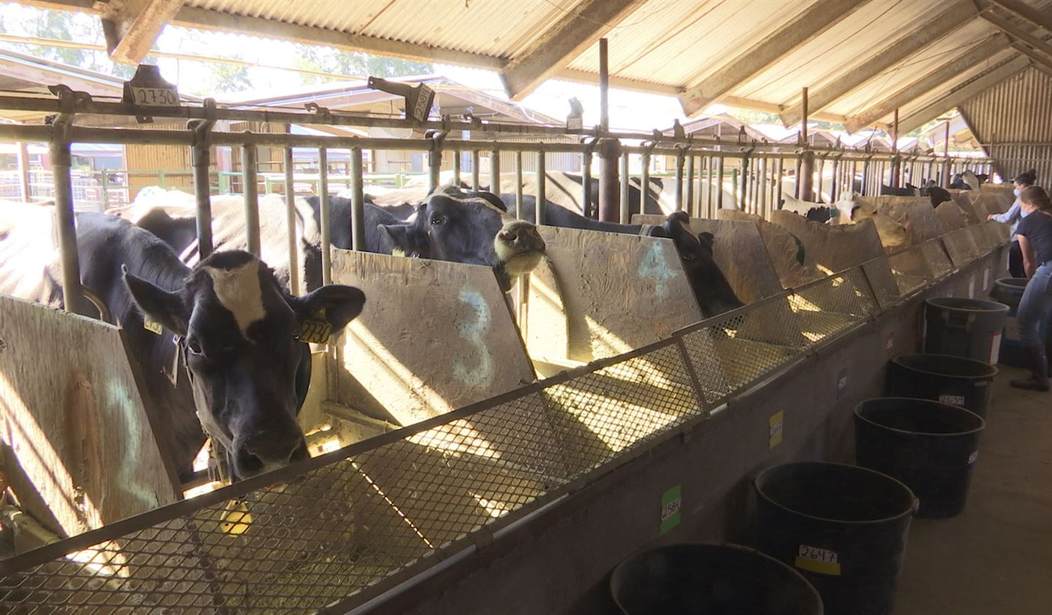Legislators have been wrangling over the future of American agriculture when it concerns the tension between interstate commerce and the ethical treatment of animals. A proposed bill titled the Ending Agricultural Trade Suppression (EATS) Act has caused quite a bit of controversy, as lawmakers debate how much influence any one state should be allowed to have over the rest of the country, when it comes to how farmers grow and raise the nation’s food supply.
Introduced by Sen. Roger Marshall (R-KS), along with several other lawmakers, the EATS Act aims to empower individual states to regulate agriculture production, especially livestock, within their own jurisdictions without interference from other states. In essence, the measure would stipulate that states cannot employ laws regulating agricultural production that go beyond existing federal rules and the laws of the state in which production is taking place.
Moreover, the proposed legislation provides a vehicle through which offended parties could challenge state regulations regarding agriculture, especially livestock. If an organization or individual is negatively affected by such a regulation, they can seek relief through the legal system.
Under the proposed law, courts would also be instructed to issue preliminary injunctions against the enforcement of the rules unless the state or local government can provide “clear and convincing evidence” that they are likely to win on the regulation’s merits at a trial. Lawmakers are currently debating whether the EATS Act should be included in the latest Farm Bill.
The proposed bill came largely as a response to California’s Proposition 12, a law that imposes specific animal welfare standards for meat products sold in the Golden State, even if it was raised elsewhere. However, there are other state-level laws that could be impacted by the EATS Act. This includes bans on the sale of foie gras, a dish made by force-feeding geese and ducks, in California and New York. It could also affect state laws ostensibly intended to stop the spread of zoonotic diseases by putting health certification requirements on the transportation of live animals. These laws have ignited a conflict between those who advocate for states’ rights and free agricultural trade against proponents of animal welfare and public health standards.
Proponents of the EATS Act argue that under current law, large states like California can effectively dictate agricultural practices across the nation. Farmers, ranchers, and other entities in states like Kansas, Iowa, and Nebraska are complaining about being compelled to comply with the Golden State’s regulations if they want to access its massive market. They insist that these regulations infringe on states' rights and pose a severe threat to the economic viability of agricultural producers across the nation.
Sen. Marshall argued:
The United States is constantly faced with non-tariff trade barriers from protectionist countries, hurting American agriculture’s access to new markets. The last thing we need is a big state like California imposing its will on ag-heavy states like Kansas with regulations that will also restrict our ability to trade among the states.
He continued, emphasizing states' rights and arguing that California can regulate agriculture within its borders, but that the state’s rules “should not apply to Kansas, whose legislatures never approved of these regulations.”
Sen. Chuck Grassley (R-IA) said Proposition 12 “is going to hurt the economy of Iowa” and noted that the EATS Act would ensure that “Iowa pork can be sold everywhere in the nation” and that “consumers can afford bacon for breakfast.”
Sen. John Cornyn (R-TX) insisted that the bill would “stop other states from driving up Texans’ grocery bills and picking winners and losers at the expense of family farms.”
On the other side of the coin, opponents of the measure claim it would undermine efforts to promote animal welfare and public health. They defend California’s Proposition 12, arguing that it is a positive step forward in protecting livestock by making sure the animals are raised in humane conditions.
Marty Irby, DC lobbyist and president of Competitive Market Action, slammed the proposal as a threat to small, independent farmers. He said in a press release:
The EATS Act is nothing more than a giveaway to Chinese interests like Smithfield and other multinational conglomerates who continue to increase concentration in the marketplace and wipe out American family farmers from the land, and it must be stopped.
A bipartisan group of 150 lawmakers signed on to a letter sent to House Agriculture Committee Chair G.T. Thompson (R-PA) and ranking member David Scott (D-GA) opposing the EATS Act. “The EATS Act goes beyond overturning Proposition 12 to threaten many other state laws. The bill is particularly draconian in that it aims to negate state and local laws even if there is no federal standard to take their place, creating an overnight regulatory vacuum,” the letter reads.
The EATS Act presents a complex debate that encompasses a myriad of issues. However, the main sticking points are states like California having so much influence over the rest of the country and the risk of adding to inflation and Americans’ grocery bills.
For instance, if livestock producers across the country are forced to overhaul their operations and farming practices to comply with regulations imposed by California and other states, they will have to spend a considerable amount of money to do so. These raised costs will inevitably be handed down to the consumer, who will have to pay even more for pork, beef, and poultry at the grocery store. In essence, it is everyday people who will have to bear the burden of these regulations.













Join the conversation as a VIP Member